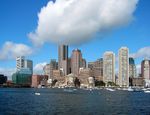MeetingOfInterest:Meeting-378
11 - 11 January 2020

|
Deadlines
Abstract submission: The abstract submission deadline has passed Registration: Registration is now closed
Meeting contact
Molly McAllister
|
The course will be held on Saturday 11 January 2020, prior to the AMS Annual Meeting in Boston, MA. Space is limited!
You do not need to register for the entire meeting you can register (http://bit.ly/amsregs) for the short course separately. Each participant is required to come with their own laptop, capable of accessing wireless internet with prerequisite software installed to participate in the hands-on exercises. See the description below for the requirements.
Course Description:
WRF-Hydro®, an open-source community model, is used for a range of projects, including flash flood prediction, regional hydroclimate impacts assessment, seasonal forecasting of water resources, and land-atmosphere coupling studies. It was designed to link multi-scale process models of the atmosphere and terrestrial hydrology to provide:
- An extensible multi-scale & multi-physics land-atmosphere modeling capability for conservative, coupled and uncoupled assimilation & prediction of major water cycle components such as precipitation, soil moisture, snow pack, ground water, streamflow, and inundation
- Accurate and reliable streamflow prediction across scales (from 0-order headwater catchments to continental river basins and from minutes to seasons)
- A research modeling testbed for evaluating and improving physical process and coupling representations
In this half-day tutorial we will provide an introduction to the capabilities within WRF-Hydro and provide participants with the basic building blocks to start their research with it. Participants will gain experience with hands-on model configuration and execution and run experimental model simulations and comparisons with a prepared example test case. Participants will also be provided with information on additional resources that can be used to further their familiarity with WRF-Hydro and build on the basics learned during this tutorial.
Instructors include subject matter experts and lead developers of WRF-Hydro and the National Water Model from the National Center for Atmospheric Research, David Gochis and Aubrey Dugger.
Each participant is required to come with their own laptop, capable of accessing wireless internet with prerequisite software installed to participate in the hands-on exercises.
- Docker (community edition) at least version 18.09.2
- (docker settings: CPUs - 2 (at bare minimum)
- Memory- 8 GB (recommended)
- Swap-1024 MB (recommended)
- Disk image max size 60 GB (recommended)
- Google Chrome web browser
